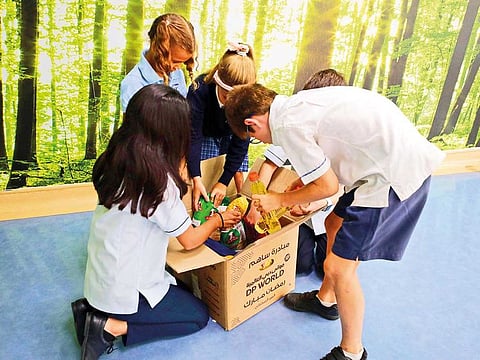Ramadan 2019: Born to be kind
Early lessons in generosity ground children to be compassionate individuals

Dubai: This Ramadan, as grown-ups consciously slow down, turn inward and nurture their inner spirit, one of the important responsibilities is to also inculcate in children the true essence of Ramadan. The values of sharing, generosity and charity are as integral to adults as they are to children. In fact, the sooner children are taught these values, the better will they grow up into compassionate individuals. Like a muscle in the body that gets stronger through exercise, compassion too grows with every act done in its guiding spirit.
Christine Kritzas, counselling psychologist at The Lighthouse Arabia, says the growing body of research on the topic suggests that humans are wired for compassion, and each carries a “compassionate instinct”.
Children’s ability to care for others rests largely in the hands of the adults, according to Kritzas. “If children are raised by kind, compassionate and loving parents, they will have more opportunities to mimic similar behaviours within the home.”
So how can parents help their children? Kritzas offers suggestions:
1. Combat negative social media messages.
There are many influences on a child’s mind in their formative years and they can come from the surrounding environment: peer group, community, family and society at large.
One of the most critical influences can be from social media which many children are exposed to.
Due to the increasingly prevalent “messages of selfishness and narcissism” that popular culture communicates to children, they are not likely to learn compassion independently, says Kritzas. So along with other social influences that may deflect children from the path, parents have to watch out for messages being disseminated through social media.
“This means that adults have to make a concerted effort to instill this essential value in children’s lives.”
While social media aims at connecting us to others, one of its downsides is that it may also increase self-centeredness in the young as they strive to create their online identities and make their presence known.
However, values such as generosity and sharing can be cultivated within children and practised at home on a daily basis.
2. Catch them young: The earlier the better
Have you noticed how, at a playground, a small child will run to the other who may have fallen and got hurt to console her?
Empathy — the ability to understand and share the feelings of another — as a value is at the core of a child’s ability to be kind and compassionate, says Kritzas.
“A child’s sense of empathy appears early in life, and it can be seen when they try to console one another on the playground. It is closely linked to compassion, and is shown to develop in children around the ages of 2-3 years, and matures around the ages of 4-5 years,” explains Kritzas.
“As with any value, the earlier it is taught to children, the more likely it will become a part of their default system whilst growing up,” she says.
3. Art of giving: Practical examples
During Ramadan, a month that promotes charity, giving and compassion for those who are less fortunate, parents must use the opportunity to teach children empathy and mindfulness of those around them, says Kritzas. However, practicing generosity and compassion should become a way of life rather than something children do annually.
Create a Value Board: “Parents can create a ‘Values Board’, which displays 10 core values they would like to instill in their children, and place it in a central part of the home.
Each week, the children can pick a value from the board, which they would like to practise,” suggested Kritzas.
Create a ritual of prayer time every day: Parents can also follow a ritual of prayer time before dinner and encourage their children to engage in an act of gratitude and appreciation for their meal before eating it.
Teach them to give away things: “Children can be encouraged to do a spring-cleaning of their wardrobes and playrooms and to donate clothes and toys which they no longer make use of. They can also be encouraged to save money and buy food for those less fortunate than them,” says Kritzas.
The adage of ‘catch them early’, stands its ground even today in all areas of child empowerment. Equipping children with social skills that include empathy not only helps them develop compassion, it also helps them develop positive interpersonal relationships, self-awareness and good self-regulation, qualities that are indispensable for maturing into wholesome adults.






